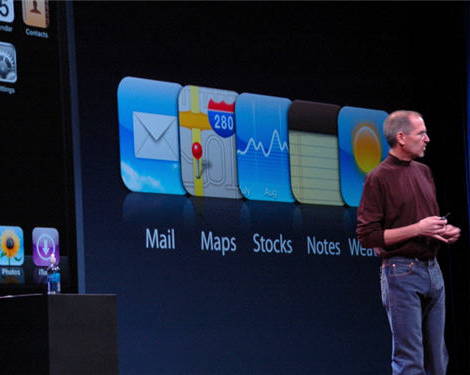Macworld Expo: Jobs vs. Gates

Apple CEO Steve Jobs strides across the stage of the Macworld Expo keynote on Tuesday and the computer industry pauses for an hour and holds its collective breath. Again, Apple delivered the goods, in hardware innovation, in services and in partnerships. What a contrast to last week's pathetic performance of Microsoft — the industry leader, right? — at the CES show in Las Vegas.
"I always root against corporations, because that's the way I am, but not this one. Not this one, it's not the same," said composer songwriter Randy Newman between songs at the Macworld Expo keynote. He was talking about Apple, of course, and the crowd ate it up.
Newman added that it was hard to follow an act like Apple CEO Steve Jobs. For most other acts in show business and for most other businessmen in the world, this statement would be just seen as politeness to the host. But today, it had a ring of truth.
Apple continues to innovate and work with its partners to carry that innovation forward with real products, software and services. This strategy creates real user value. From the reaction of the buying public — and not just from the Mac faithful — they appreciate this innovation.
But more importantly for its customers, Apple doesn't talk about its innovation: it executes on its technology.
Let's look at a couple of examples demonstrated in the keynote on Tuesday:
MacBook Air. Instead of waiting for its chip partner Intel to shift to a new, faster process (or use a current-generation lower-performance processor), Apple worked with Intel to shrink the packaging on the Core 2 Duo by 60 percent. Jobs said this was what let Apple reduce the size of the notebook's logic board.
According to Intel CEO Paul Otellini, Apple came to Intel to request the change over a year ago. "When we started this project we didn't think it was possible. The product that we ended up building for [Apple] is about the width of a dime, it's as thick as a nickel; it has 400 million really fast really efficient transistors. It is state of the art."
Is the processor in the MacBook Air a Penryn? From the comments in the keynote, it didn't sound like it. We will soon see. In addition, the new notebook introduces Remote Disc, a software install for Macs and Windows machines that lets MacBook Air owners "borrow" the optical drive of a remote machine. It's clear that Remote Disc leverages Apple's Bonjour wireless discovery and configuration technology.
iTunes Movie Rentals. Instead of getting just a few studios to come along with their content, Apple appears to have them all. Jobs said, "We've got it all together," pointing to the rental plan, as well as the revamped set-top box.
Jim Gianopulos, chairman and CEO of 20th Century Fox described the new online store as a "transformative version of the retail model."
"VOD, video rentals, are not a new thing. They are certainly available in other ways and continue to be, and people may make those choices. But there was music and then there was the iPod; there was the phone and then there was the iPhone. So, Apple does things in very intuitive, insightful and innovative [ways] ..."
But the Apple connection with the content provider continued. Shipping each of its new DVDs, Gianopulos said, would be a digital copy that customers can play on their iPod and computer.
(Note that Apple offered the new capabilities of the Apple TV for free as a software update. And the same thing was done for the new features added to the iPhone and iPod Touch. Would a PC vendor have done the same?)
Here's the problem for the rest of the industry (and it's why everyone else hates Apple): The company keeps innovating and keeps executing. It's that simple.
Now, Microsoft likes to think it's the thought leader in the industry. It thinks big, but often keeps coming up short, meaning that we may or may not wind up seeing a particular technology in a product for sale.
Or worse, the company and its products look silly. Case in point, we're all growing tired of MS Surface.
The buzz meter isn't rising with half-baked demonstrations of Microsoft Surface, a product that seems to have plenty of applications but no buyers.
According to Mary Jo Foley in All about Microsoft, the "only truly futuristic technology that Gates showed during his hour-plus CES appearance was a piece of visual-recognition software under development by Microsoft Research that, some day, may be integrated into cell phones and other devices."
Gates pointed a black-box mock-up device at faces and the software instantly recognized and identified them, providing all kinds of related information (like how much money they owe you). Point the device at a theater and it provided the theater name, address and a list of movies playing. Gates showed a slick, 3D interactive interface that would act as the central focal point for all of the visual data stored on a device, organizing it into browseable categories.
But that's the problem isn't it? Microsoft and Bill Gates (and the rest of the captains of the tech industry) are busy showing off their great technologies.
Apple, on the other hand, just shows off great technology in products as well as partnerships that solve customer problems. That keeps being Apple's differentiator.
